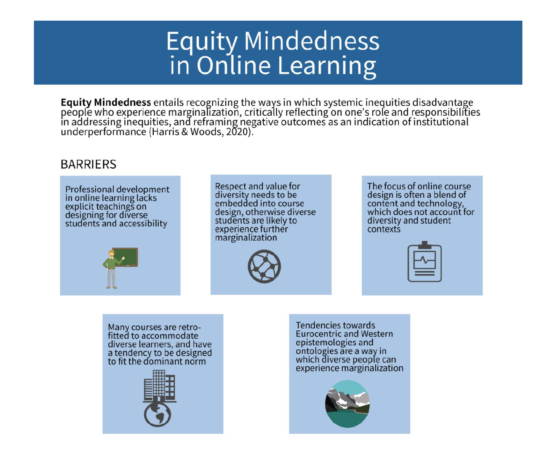
Sator, A. and Williams, H. (2020) Removing Barriers to Online Learning Through a Teaching and Learning Lens Victoria BC: BCcampus/ABLE Research Consultants
Equity and online learning
The issue of equity has always been inherent in discussions of distance education, because the aim of distance education is usually to widen access to those unable to access conventional educational offerings. However, as online learning has grown, and has become more mainstream, particularly in terms of blended and hybrid learning, critics have quite reasonably raised questions about whether or not online learning actually increases inequities, particularly for those in poverty, in remote regions, or within specific socio-economic or ethnic groups.
At the same time, the growing demands to root out systemic racism, and for organisations to look inwardly at their processes and cultures for inherent or unconscious racial bias, are also relevant to the design of online learning. As Sator and Williams note:
The design of instruction is not culturally neutral.
Thus this report, commissioned before Covid-19 and the recent anti-racism demonstrations, could not be more timely. It is evidence-based and addresses directly the role of online learning in terms of adding to or alleviating inequity in educational provision.
Once again, I strongly recommend readers to study the original report (49 pp) because the details are important, but here is a brief summary.
The report’s objectives
- Report on scholarly findings regarding barriers to online learning, specifically for rural, remote, and equity-seeking students.
- Identify B.C. post-secondary education concerns regarding online learning, and categorize evidence-based equity practices with a focus on access to materials, digital literacy, quality of instruction and resources, and pedagogy.
- Identify B.C. post-secondary students and potential students from rural and remote areas, specifically those of equity-seeking status, regarding their needs for materials, digital literacy, quality of instruction and resources, and pedagogy.
- Produce a report that provides an overview of the commonalities and distinctions between scholarship, institutional practices, and student participant perspectives to identify strategies to improve online learning, teaching, and educational technologies.
Factors in online learning relevant to equity issues
The three foundational underpinnings for pedagogy in online learning are
- equity mindedness,
- cultural affirmation, and
- social engagement.
The following need to be considered for equity issues when considering or designing online learning:
- access to materials
- digital literacy
- quality of instruction and resources
- pedagogical issues:
- ‘equity mindedness’
- reflecting the cultural diversity of learners in course materials and design
- use of universal design for enabling greater accessibility to materials
- intentional community building for social engagement.
Evidence-based strategies
The report sets out a list of practical, evidence-based strategies for each of these issues. You will need to read the report in full for these as there are between six to ten strategies set out for each issue.
Conclusions and comment
This report strongly supports the need for online learning, but recognises that it must done professionally and with equity in mind. It calls for all instructors to be trained in teaching online with equity issues part of the training.
It recommends that ‘Course content should reflect diverse epistemologies and ontologies.’ (This of course would apply equally well to campus-based teaching, but since online learning is often used specifically to reach disadvantaged learners, it becomes even more important.)
It is a call for instructors and course designers to not only know and understand the diversity of their students, but to reflect this within the design of their courses.
I think this is one of the most important reports about the design of online learning to be published in recent years. I am proud that this is a report based on research conducted in British Columbia on behalf of BCcampus. The report should profoundly change the way online courses are designed. It should result in attempts to reach out to diverse communities, and in Canada, specifically to First Nations and indigenous communities, so that their ways of knowing and their needs can be accommodated and reflected within online course design. Everyone would benefit. So please read this report.









 Dr. Tony Bates is the author of eleven books in the field of online learning and distance education. He has provided consulting services specializing in training in the planning and management of online learning and distance education, working with over 40 organizations in 25 countries. Tony is a Research Associate with Contact North | Contact Nord, Ontario’s Distance Education & Training Network.
Dr. Tony Bates is the author of eleven books in the field of online learning and distance education. He has provided consulting services specializing in training in the planning and management of online learning and distance education, working with over 40 organizations in 25 countries. Tony is a Research Associate with Contact North | Contact Nord, Ontario’s Distance Education & Training Network.

